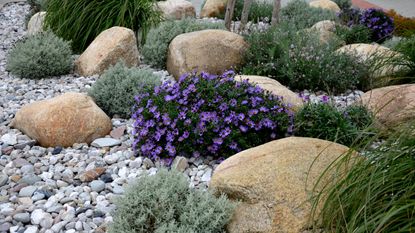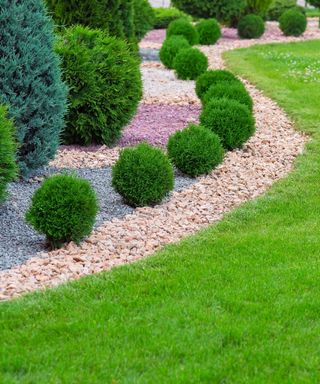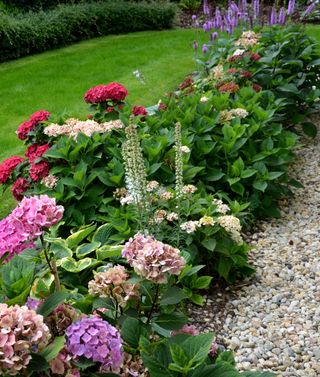Using rocks instead of mulch – this low-maintenance alternative will control weeds and improve drainage
Thinking of using rocks instead of mulch? Here’s why you should experiment with stones' durability and aesthetic appeal


Thinking of using rocks instead of mulch in your garden? This naturalistic technique is amongst the most effective ways to control some weeds and improve drainage, and its natural aesthetic will accentuate almost all spaces instantly.
If you're looking for a timeless way to elevate your rock garden ideas – whether that is in terms of landscaping or plant health – using rocks instead of mulch may be the solution you desire. Here's what the experts want you to know before bringing this organic material into your exteriors.
Using rocks instead of mulch – 3 benefits of this stylish alternative
This method is a favorite amongst the experts, but its benefits extend beyond its style – here’s how rocks can improve your garden, fast.

1. Rocks are the aesthetic alternative
While the advantages of using rocks instead of mulch are not limited to its good looks, it's still a great place to start.
'In a garden, garden rock creates a sharp, clean look. It contrasts nicely with the rich textures of the plants, unlike mulch,' explains Zaeem Chaudhary, an Architectural Draftsman at AC Design Solutions. Every type of stone has different benefits to improve your garden landscaping ideas – whether you choose pebbles or crushed gravel – that are particularly popular choices in the garden.
'Crushed gravel, for example, is a popular choice for paths because, unlike other hardscaping options, it has a natural feel. It can also be used to create a natural border across walks and garden bed ideas,' Zaeem says.
The architecture expert suggests creating a 'zen portion of the landscape' by also using sand that can act as an alternative to water.
2. Rocks are a durable solution
While mulch is described as a 'porous material' that degrades over time, rocks will stand the test of time.
'Rock is [strong enough to survive] rain and wind and heavy enough even to stay put even in the face of powerful winds and storms,' Zaeem says. After laying rocks in your garden, they have no defined lifespan and, as the expert suggests, care is simple. He recommends scrubbing the area occasionally to ensure the pebbles look fresh throughout the seasons.

3. Impact weed control and drainage
In some cases, using rocks instead of mulch can promote better drainage in your garden and control weeds. But you do need to use this method carefully.
'Mulch retains excess water, resulting in unattractive puddles that can lead to root disease and plant death. On hot days, the liquid evaporates quickly, producing too dry conditions; nonetheless, rock maintains a comfortable balance,' Zaeem explains. 'It helps drainage by preventing extra water from being absorbed by the ground beneath it, while also providing shade on hotter days to keep the soil moist.'
However, if you're looking at how to get rid of weeds above the stones, this method may not help. Tim Sheppard from Soil Shepherds warns that while weed fabric may stop the seeds currently on the ground, it does not consider all weed seeds that will be deposited on top of the rocks. So, if you're looking to get rid of all weeds, you may need to rely on another tactic.
Whatever your reasons for using rocks instead of mulch, this alternative has benefits that will work in every garden – and we expect it will stay in style for many more seasons to come.
Sign up to the Homes & Gardens newsletter
Decor Ideas. Project Inspiration. Expert Advice. Delivered to your inbox.

Megan is the Head of Celebrity Style News at Homes & Gardens. She first joined Future Plc as a News Writer across their interiors titles, including Livingetc and Real Homes, before becoming H&G's News Editor in April 2022. She now leads the Celebrity/ News team. Before joining Future, Megan worked as a News Explainer at The Telegraph, following her MA in International Journalism at the University of Leeds. During her BA in English Literature and Creative Writing, she gained writing experience in the US while studying in New York. Megan also focused on travel writing during her time living in Paris, where she produced content for a French travel site. She currently lives in London with her antique typewriter and an expansive collection of houseplants.
-
 5 items I never throw out – and how I reuse them around my home
5 items I never throw out – and how I reuse them around my homeI share the five things I never throw out when I can help it, and reveal the five ways I reuse them around my house to help limit the impact on the environment
By Chiana Dickson Published
-
 Michael Douglas and Catherine Zeta-Jones' simple kitchen cabinet color is a masterclass in balance and contrast
Michael Douglas and Catherine Zeta-Jones' simple kitchen cabinet color is a masterclass in balance and contrastA classic cabinet color shines in the actors' kitchen. The actors space proves why this traditional look is always in style
By Sophie Edwards Published